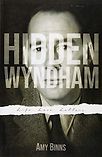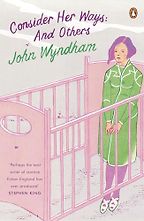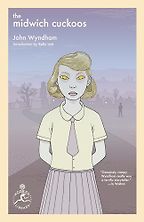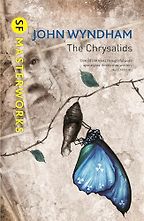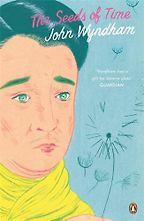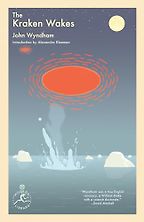Some of John Wyndham’s work is very famous, but the man is less well known: he has been called ‘the invisible man of science fiction’. Who was he?
John Wyndham sprung to prominence after the Second World War, writing appalling dystopian visions of the future, which were very well researched and brilliantly well written. He appeared to be an incredibly new and exciting writer, and people assumed in the 40s and 50s that he was one of that new generation. Actually, he was born in 1903, and by the time he had his first big hit he was well into his 40s. And I think that explains why his writing is so good… It’s so spare. If you pick up any of his books, you think, “God, this is less than 200 pages” – compared to some of the massively bloated books that we read today, huge trilogies and series sold by weight. That’s because he spent the late 20s and the 30s writing pulp fiction magazine stories, short fiction aimed mostly at young men, science fiction stories about robots and rockets and going to the moon.
Then he had a very difficult war. He was living in a Quaker hostel, and he was a very intelligent and thoughtful man, so he was quite morally conflicted about taking part in the war. He was in London during the Blitz, and he did lots of fire watching. I think you see that in all the visions of destroyed London in Day of the Triffids – they’re coming from real experiences. Then he was conscripted into the army, and he took part in the D-Day landings. He was in the last tranche of people – it actually wasn’t just one day, it took about a week to get everybody across. He landed on the beach where there was a lot of very heavy fighting. He took part in another very difficult battle where a group of Nazi troops held out to the last man, and they were encircled by British troops, and the smell was appalling at the end of the battle; he talks about feeling like he’s become impure, and that people will somehow know when he gets back. So after this very, very difficult war, he came back to Britain, and was again struggling to be a writer… And then wrote this incredible book, The Day of the Triffids.
Triffids combined – for the first time, really, in science fiction – the science bit, the satellites and the germ warfare and dealing with a destroyed world, with the thing we associate with John Wyndham: humanity. What happens to people? How do people react? And because he joined those two things together, suddenly he was lifted into a whole different level of brilliance. He’d done this very technical apprenticeship of writing pulp fiction for people who aren’t necessarily very keen readers or students of literature – they just want to be entertained, and they want the story to keep moving, and they’re going to get bored really easily. Then he suddenly combined that with this incredible emotional depth.
They’re also funny books. There’s a lot of wit in them. They’re very clever. And I think that is what makes John Wyndham stand out and stay fresh for generation after generation: the humanity that informs all his books, the emotional intelligence, really stands out in the field. Loads of women who say they don’t read science fiction, who think they’ve never read science fiction, actually have read all of John Wyndham, because he writes fantastic female characters, and he writes in a way that resonates. I think that’s why we’re still reading and talking about Wyndham, when lot of science fiction of the time is terribly dated.
Let’s talk about his female characters, then, because it’s very pertinent to your first choice: tell us about the short story collection, Consider Her Ways.
Even though Wyndham wrote several novels which were very successful, he carried on enjoying writing short stories. He wrote them to entertain himself, and lots of them could be entire novels. Some of them are funny; some of them are horrifying; some of them explore ideas that are really very complicated or unusual.
Consider Her Ways is one of the most interesting of his short story collections because of that story at the start of it, Consider Her Ways. Although also, looking through it, Stitch in Time, Random Quest… a lot of them are about women. Consider Her Ways is, as far as I know, the first exploration of what a world would look like if there were only women in it.
In some ways, it feels a bit dated. For instance, he says that there’s less technological innovation – some, but less. The name, ‘consider her ways’, comes from the Bible: ‘go to the ant thou sluggard, and consider her ways’. The idea is that women set up a world that’s modelled on an ant’s nest: there are people who are mothers, and that is their only function; there are people who are workers; there are the intelligentsia, the doctors; and there are the people who care for the mothers, the carers. Everybody knows their place. Everybody has a function.
It’s very conflicted, as a story; he’s not sure if this is a good world or not. His narrator – it’s written from the first-person viewpoint of a woman who visits this world – she’s not sure if she likes it or not. She can see the pros, she can see the cons. The women she talks to think that it’s an improvement, but on the other hand, they’ve never known a world with men in it. It’s a really interesting exploration of an idea that I think would have occurred to very, very few men to write. It was first published in 1961, so he was probably writing it in the late ’50s.
Then the other stories in it… There’s one called Stitch in Time, which is playing with time travel, and Random Quest, which is playing with the idea of alternative universes, which might be a bit like ours, but different. Of course, that’s something authors have been playing with now for a very long time. It’s a nice collection of stories, but I think Consider Her Ways is clearly the standout one in there.
Along with Trouble With Lichen, this is his most direct reflection on motherhood and women – but he’s ambivalent about motherhood in all his stories.
Yes, very ambivalent about motherhood. He took the view that marriage was slavery for women – not just in the sense that they couldn’t escape it, but also in the sense that it turned them into slaves, and there was an inevitable mental subjugation that came with chaining yourself to a man. He didn’t really seem to believe that it could ever be a partnership of equals. He thought that inevitably, the slave would start acting like a slave. And the motherhood issue was part of that.
He himself had a disastrous childhood. He lived in a very wealthy family, quite religious in some ways – his grandparents and wider family certainly were, which comes out in the Chrysalids, which we’ll discuss later. His mother just had no idea what to do with herself. The children were sent off to a whole variety of schools, and she went to live in hotels where she drank whiskey and played bridge for her entire life. She didn’t actually raise the boys very much. Whenever she got bored of one place and decided to go and try some spa in another, she would move the boys – Wyndham had a younger brother – to another boarding school, closer to where her new hotel was going to be. So they had this disrupted childhood governed by quite a selfish woman, who doubtless loved them, but really was not engaging with the whole project – and who had moved straight from daughterhood to wifehood, and then when her marriage failed, back to daughterhood again, without ever really being independent in any way.
He was very ambivalent about mothers and motherhood, but he could see that it was something incredibly powerful. There’s another short story in the other collection we’ll discuss, called Survival, where a woman does everything she can to protect her baby, ruthlessly – so he could see that it was this massive driving force behind the universe, and that actually nothing mattered apart from that. Everything else was just playing around with boys’ toys. But he seemed to think it was mentally narrowing and damaging to women, that laser focus, that inevitably meant they lost a broader vision. Quite a strange attitude, really. He himself never had any children – as far as we can tell, by choice – and neither did his brother; both were in long term, very happy relationships, but neither had any children.
Let’s talk about your next choice, where the same ambivalence is played with in a much stranger way… Tell us about The Midwich Cuckoos.
This was dramatized quite recently, with Keeley Hawes. They did a decent job, actually. It’s something that’s been dramatized a number of times because it’s such a great story. Margaret Atwood spoke about how she read The Midwich Cuckoos when she was a student, and it freaked her out so badly she had dreams about these evil children for weeks.
This story is about how the instinct of motherhood can be subverted by an alien intelligence. Obviously, a cuckoo lays eggs in another bird’s nest. This group of women all give birth to babies who apparently are physically normal, but who can control them, and communicate with each other, and who develop much more quickly than ordinary children. They clearly have their own end in view. It’s about the way the instinct of motherhood can be used against the mothers in this case, but also against the whole community – it feels wrong to look at children and say that they’re evil or they’re other. And yet, in this case, it is actually true: the children are, if not evil, certainly other.
It has a lot of resonance, because lots of people feel the new generation is other, that there’s something disturbing about them that freaks us out. I think that idea continues to be current. In this particular story, yes, they really are other. I think it resonates with young people in the same way that Chrysalids does, where they can see themselves as being the other, and that might not be a bad thing.
Let’s talk about The Chrysalids next then, your third choice! I had never noticed, until you pointed it out in Hidden Wyndham, that The Chrysalids is the mirror of The Midwich Cuckoos – we just follow the children’s perspective. Once you’ve seen it, it’s staring you in the face. But it’s disguised by a different premise…
Yes, The Chrysalids is essentially the same kind of story. There’s a society that’s dealing reasonably well with its own affairs – not particularly well – and some children are born who appear physically normal, but who can communicate with each other.
Now, John Wyndham really hated religion. He thought it was another of the things that kept people stupid, kept people from thinking, kept everybody backward; and that it was particularly destructive to women. When you read The Chrysalids, you think, “God, this is The Handmaid’s Tale” – which came out in 1985, and again Chrysalids was very early, first published in 1955. There’s an extremely religious, puritanical society, set in a post-apocalyptic world many generations after a nuclear war, which has led to mutations. Typically, animals with mutations are destroyed, and humans with mutations, if they are healthy enough to live, are sterilized and excluded from society. The Chrysalids is about a group of young people who are born physically normal but mentally different, and how they survive in this appalling world, this brutally religious world, this very self-righteous self-regarding world where purity is worshipped, knowing themselves to be impure.
These young people are clearly a very threatening type of mutation to the old order. They’ve been walking amongst normal people, and people did not know – and I think that’s another idea that goes with John Wyndham constantly, this idea of the other walking amongst you but not of you, the other that appears to be normal. It’s a feeling a lot of us have, that other people don’t really understand us, and we’re walking through a crowd of people but not really connecting with any of them. There was a poem that he was obsessed by, The Jolly Company by Rupert Brookes: he writes about looking up at the stars, which all appear to be a lovely constellation, but if you were in the stars you would know yourself alone – and when they look down on us, they must see us as a crowd or a society, but within it are individuals that feel alone. That’s an idea that Wyndham comes back to over and over again, the idea of being part of something that you don’t actually feel part of – being an outsider, even though you don’t appear to be an outsider.
It’s never been filmed, and yet if you ask people of a certain age, “What’s your desert island book?”, lots of people will say The Chrysalids. It’s relatively short – my Penguin copy is about 190 pages, easy to read. It was commonly given as a book for teenagers to read in schools, because it’s got lots of issues that young people are interested in, the idea of the new generation. And it’s a great adventure story as well – with all these stories, we talk about the emotional resonance, but they’re all adventure stories. It was very, very widely read, and I don’t really understand why it’s never been filmed.
Again, it’s very ambivalent. Are these new people, the children’s kind of people, really better? Are they kinder? Will it be better under their rule than under the old ways? There’s a lot to think about.
The outsider theme is interesting… In Hidden Wyndham, your biography of Wyndham, we certainly meet an outsider. A lonely child of course, but later as an adult there’s a voluntary loneliness – he lives in a club, and he’s part of the White Hart group with Arthur C. Clarke and the others, but he stays private. Good friends didn’t know about his long-term partner. What was it like as a biographer, uncovering this very hidden person?
It was so strange! I really don’t know how he did it… He was living in a room on the top floor of a Quaker-run club, or hostel, whatever you want to call it. It was set up for young men who’d been ambulance drivers in the First World War, to give them a club in London – after the war, there were lots of clubs for people who’d been in the services, and people who’d been conscientious objectors but driven ambulances weren’t really part of that. So it’s set up as a club for outsiders, in a way. You could live in it: there were students who treated it as halls, and there were people who lived in it for a few months, but you could also go and stay there for a couple of weeks. And even if you had your own room and you lived there for years, if you went away for a couple of weeks the room would be let to somebody else. So it was never actually your room, even if, like John Wyndham, you were living there for 20 or 30 years. He lived life in this hostel, in one room, with his long-term girlfriend in the next room – to all intents and purposes, married. But fantastically, all food’s laid on, and no one has to do any housework. So that was his way of dealing with having a partnership that was not a marriage.
It’s not clear, even within the hostel, how many people knew that Grace was his girlfriend. They’d somehow managed to end up being allocated rooms next to each other, which makes you think people must have known. And yet at the same time, there are references to the question of whether her cousin knows – and her cousin also lived in the hostel.
Then down the road, there’s a group of men he was drinking with every Thursday, talking about books. He was the quiet man in the corner, but he’s the man that they turned to when they wanted to set up a new magazine, for example, and he was handing out prizes at events. In a quiet way, he was very well respected. They probably thought he was perhaps gay, or maybe just celibate, somebody who wasn’t really very capable of dealing with women in real life, off the page. Then one day, he walked into the pub and said, “I’ve got married.” And they all said they just couldn’t believe it, that they’d known him 40 years and yet never actually known him.
I’m not sure how you could live in such a schismatic way. It’s incredibly private, and he obviously wanted to keep himself private because he chose to burn all of Grace’s letters. So we only have one half of the correspondence, because he made a condition that he wanted all his correspondence, his diaries, to be burnt. Grace apparently chose to do as he’d said, as far as destroying her letters to him, which he’d kept; but she obviously decided she didn’t want to destroy his letters to her. I mean, why would you?
It was very strange writing his biography. I found out things about him that he didn’t know. He had this ridiculous long name – John Wyndham Parkes Lucas Beynon Harris – and he never knew why he was called Wyndham. He thought that it was something to do with Wyndham theatre. But actually it was a bit of brown-nosing by his father, who was from Wales, and there’s a very famous Wyndham family in Wales who his father had very slightly known. It was very strange, knowing that he had never known that… a strange experience, but a lot of fun.
It’s a fascinating biography, because the major themes of his books are so clear in his personal life… Let’s look at your next choice, another short story collection, which takes in a lot of those themes: The Seeds of Time.
If you don’t want to commit to a whole novel and you want a little story to read, Seeds of Time is a really good collection. There’s some fun stories in there, some scary stories in there, some very touching stories in there. It shows his range. Loads of these stories could be entire films. Something like Survival is scary, real freak-out stuff; but then something like Chronoclasm is a fun little time travel story, silly and ridiculous…
With the hero of Chronoclasm, you spend the story thinking, “For God’s sake, man!”. A lot of his heroes are really a bit hopeless: they’ve nearly got it together, but not quite. And all of the heroines are really competent. Take Kraken Wakes – the world comes to an end, but it turns out that the wife actually had it all under control. There’s a lot of heroines sorting things out in the background, while the men are fretting and worrying and weighing up the moral pros and cons of the situation, and considering whether or not they really maybe ought to do something – they turn around and the women have got the bags packed. In Chronoclasm, this poor young man is relentlessly out-manoeuvred by a time-travelling woman from the future.
Pawley’s Peepholes is just pure fun… Pillar to Post I found very disturbing. It explores what happens if you live a really long time, and you lose the zest for life, but you carry on living. And then it’s got probably my all-time favourite John Wyndham short story: Dumb Martian.
This is a story where marriage is literal slavery. A very unattractive character runs out of money, and takes a posting on a remote hunk of rock in space, the equivalent of a backwoods filling station. He’s going to live there for two years in order to save enough money to come home to Earth. To keep himself entertained, he buys a Martian girl, and he is obliged to marry her to get around the immigration rules. So he is married to her, but she is also literally a slave. The whole story is told entirely from his point of view; she is almost expressionless, and she barely speaks. She says the odd word, but her first entire sentence is halfway through the story. But it’s about what she is doing all the time in the background, to break free. It encapsulates a lot of John Wyndham’s ideas about morality and slavery and what it means to be a slave, and the stupidity of racism – she is obviously not just a different race, but a different species, as well as a different sex. It’s also a funny story, because he’s so awful and he’s so stupid all the way through. It’s just a perfect, tiny story that has so much in it.
We’ve come to your last choice already – featuring another of his incredibly competent women – or arguably the same competent woman, Grace again!
Yes, she’s the same woman! That’s actually why I started writing the biography: it struck me that it’s always the same woman, and I thought, ‘This has to be a real person’. I looked it up on Wikipedia, and it just said he got married in later life. And I thought, ‘There’s surely more than this…’
Yes! In the biography you quote him writing to his agent about this last book, and it really tickled me: ‘Am filled with deep dismay about the whole thing.’ With that as an introduction, tell us about The Kraken Wakes!
Yes it’s funny, he hated all his work, and every time he finished a story he was sure it was the worst thing he’d ever written. He had a full-on day or two or three of appalling depression at the end of every book, where he’d say, “It’s finished, but it’s just terrible”. I think as writers, that really resonates with a lot of us: you have a brilliant idea and then you write it, and it’s so second rate, it’s so much less than you wanted it to be. It’s quite reassuring to know that he also went through that.
The Kraken Wakes hasn’t been filmed – it would be very difficult to film, because it’s a drowned world story – but it has been made into a computer game. He does this very clever thing: we think this story is about aliens. We’re pretty sure it’s about aliens. But we never actually see them in any way. We never meet them, we don’t know what they’re thinking or why they’re doing what they’re doing. We can make some guesses, but we don’t really know, and we can never communicate with them in any way, so we can never find out. So it’s a very unusual alien invasion story in that we see some of the things the aliens make, but we never really see the aliens themselves; and we never really know what kills them in the end. A lot of the story is really about how people deal with the end of the world, how people behave and how it’s possible to survive that.
My dad is a very keen sailor, so I grew up more or less willingly in small boats all my childhood. There’s a brilliant bit where they’re sailing in a small boat through the streets of London, and they can’t remember whether the lampposts were in the middle of the street or the sides, and obviously they don’t want to hull the boat by driving onto one. That’s another thing that John Wyndham does really well: these small, practical details. What would it actually be like if you were in a boat going through London, past all those buildings, and knowing that they’re all starting to collapse, and that there are lampposts underneath you? He really brings that vision to us.
I say to you now, “Oh, it’s a drowned-world story”, and we all know what those are. But Kraken Wakes was probably one of the first. Another great read, with a married couple, a hero and heroine, who are very funny – very witty about what people believe and what people just can’t believe.
I was fascinated to read that he pushed back when the publishers wanted us to see the aliens. It made me think of something else you revealed about Triffids, that the original version had the Triffids come from space and he changed it to experimentation gone wrong… Even though he was very interested in scientific advances, the causes of change are never really the point, for Wyndham.
Yes, and that’s part of what helps us identify with the people in his stories – because actually, if you were in that world, you might never know. I don’t know where COVID came from, and neither do you. People are going to tell us “We think it was this or that” – “There’s an 80% chance it was the wet market, there’s a 20% chance it came from the lab.” There is a truth, but we’re never going to know it. And we all lived with that – we all lived with not knowing.
His characters are perhaps a little bit more capable than most of the people in their world, but they’re never the main scientist, so we’re lost with them. Same in The Chrysalids – no one has any idea why their world is the way it is, and a lot of the things that were real have now become myth. It’s something that makes his books more real for us, that we’re not up there with the aristocracy or the intelligentsia; we’re just trying to live here, while all these things happen around us.
We’ve touched on so many trademark Wyndham themes. Before we go, is there anything else characteristic of Wyndham we should mention?
One thing… These stories are not directly love stories. But for Wyndham, one of the things that was really hidden was who he loved in his life, and actually he was a very loving person. He had this very long-standing relationship with Grace, whom he ultimately married; he was very close to his brother, who was really quite hard work – good fun, but hard work; and although his mother was incredibly difficult, he carried on looking after her until she died. He had a group of friends who adored him, going back a very long way, to old school friends who were probably the people who knew him best.
I think that’s something that permeates these books: an underlying love between the characters that doesn’t need to be spelled out, because it’s like bedrock. Take The Chrysalids – these children are friends, and they’re not going to give each other up (which makes the betrayal of one of those people so absolutely heart-rending!). In Triffids they’re trying to find each other, and there’s a romance, but it never has to be explicit…
Before we started this interview, you said that when you read Wyndham as a teen you just knew you were having a good time, and it was only later that you realised the writing is brilliant. Yes! His writing is not simple. It’s not even particularly easy. But there is no word wasted. And the underlying warmth of these books is something that makes them survive.
Interview by Sylvia Bishop
October 20, 2024. Updated: October 3, 2025
Five Books aims to keep its book recommendations and interviews up to date. If you are the interviewee and would like to update your choice of books (or even just what you say about them) please email us at [email protected]
Five Books interviews are expensive to produce. If you've enjoyed this interview, please support us by donating a small amount.

